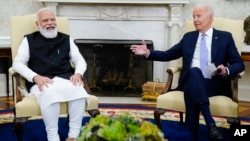NEW DELHI — The Ukraine crisis has presented India with its toughest diplomatic challenge in recent decades as New Delhi juggles ties with its old partner Russia and its growing relationship with the United States.
India has abstained from two votes in recent days at the United Nations Security Council — one deploring Russia’s aggression against Ukraine and another procedural vote calling for an emergency session of the U.N. General Assembly.
Political analysts say India’s stance is influenced by its heavy reliance for weapons on Moscow at a time when tensions with China are running high and its unwillingness to abandon a partner that has stood by it in the past.
But India’s need for Western partners to counter China could make it hard for New Delhi to stay on a neutral path as the crisis in Ukraine unfolds, according to political analysts.
“If India’s strategic challenge is China, the reality is that India needs both Russia and the West to counter Beijing. In the short term we are dependent on Russia for about 65% of our defense supplies and in the long term we need the West to take on China and manage its rise,” says Harsh Pant, head of the Strategic Studies Program at the Observer Research Foundation in New Delhi.
While the Biden administration had pressed India on the need for a “strong collective response” before the U.N. Security council vote on the resolution deploring Russia’s aggression, the Russian embassy in New Delhi welcomed India’s “independent and balanced position,” after it abstained.
But even as it steered away from condemning Russia, New Delhi has voiced some implicit criticism of Moscow saying that there is no choice but to return to the path of diplomacy and dialogue and that all U.N. members should honor principles such as respect for sovereignty and territorial integrity of countries. Prime Minister Narendra Modi in a phone call with Russian President Vladimir Putin last Thursday called for an “immediate cessation of violence” and “concerted efforts from all sides to return to the path of diplomatic negotiations.”
But in New Delhi, outright alienation of Russia is not an option. From T-90 tanks to MiG and Sukhoi fighter jets, an aircraft carrier and a nuclear submarine leased to the Indian navy, Russian arms are the mainstay of its armed forces. The Russian envoy in New Delhi, Roman Babushkin, underlined the dependence as he called for India’s support. “Russia is the only country which is sharing sophisticated technologies with India and defense cooperation between us is a strong factor for international peace and stability,” he told reporters.
New Delhi has other worries — will the current crisis push Russia closer to China, making it even harder for India to counter Beijing?
Washington has for the time being “grudgingly” accepted New Delhi’s position, say analysts.
“We share important interests with India. We share important values with India. And we know India has a relationship with Russia that is distinct from the relationship that we have with Russia. Of course, that is okay,” U.S. State Department spokesman, Ned Price said Friday responding to a question on whether the Ukranian crisis has strained the relationship.
But questions will be raised in the United States about India’s role in the Quad grouping — the partnership formed between U.S., Australia, Japan and India to counter China in the Indo Pacific as India stands apart from the other three countries that have condemned Russia for its actions in Ukraine.
“As the negative sentiment about Russia gets accentuated, many in the U.S. will ask questions about what kind of a partnership can you have with India which has such close ties with Russia,” says Pant. “It will require a lot of hard work on India’s side to convince the U.S. Congress that without Russia’s help, India cannot stand up to China.”
Bilateral ties with the U.S. may not be a problem in the immediate term, but India will face pressure to cut back or even halt future arms imports from Russia.
“The bottom line is that the war in Ukraine has woken New Delhi and Washington up to the fact that the Russia issue has the potential down the road to become more than a mere nuisance in bilateral relations,” according to Michael Kugelman, deputy director of the Asia Program at the U.S.-based Wilson Center.
While New Delhi is staying neutral for the time being, India's position could become untenable if the situation in Ukraine escalates, say analysts.
“India’s fence sitting is an especially big gamble in this current crisis, given that Russia’s aggression may be its most egregious since the end of the Cold War, and given that US-India relations have soared to new heights in recent years,” says Kugelman. “But I don’t anticipate India changing its position, especially as the U.S. has accepted it, anytime soon.”
But he says an escalating war could “prompt the fence on which India is sitting to collapse, obliging it to take a stronger position.”





